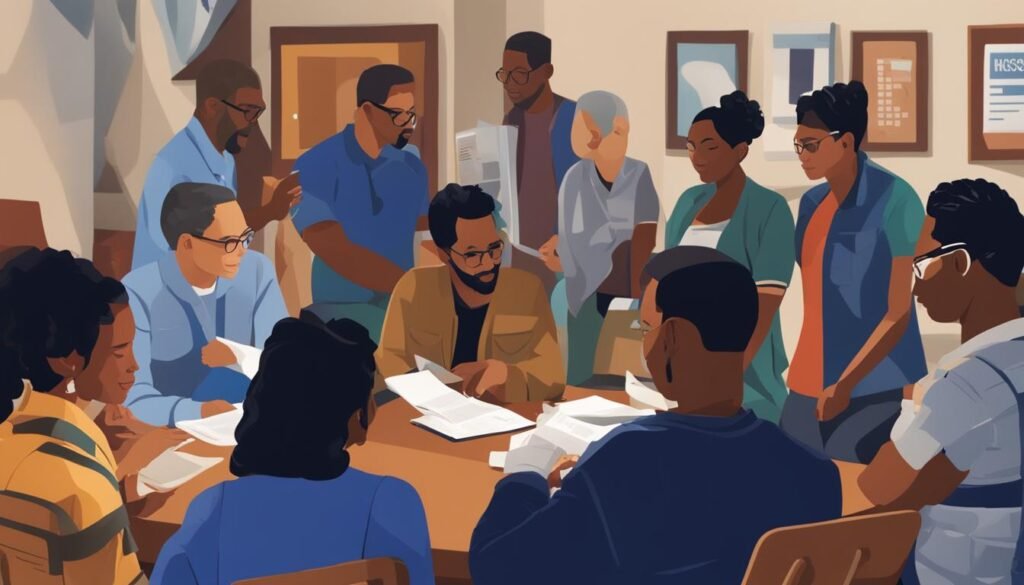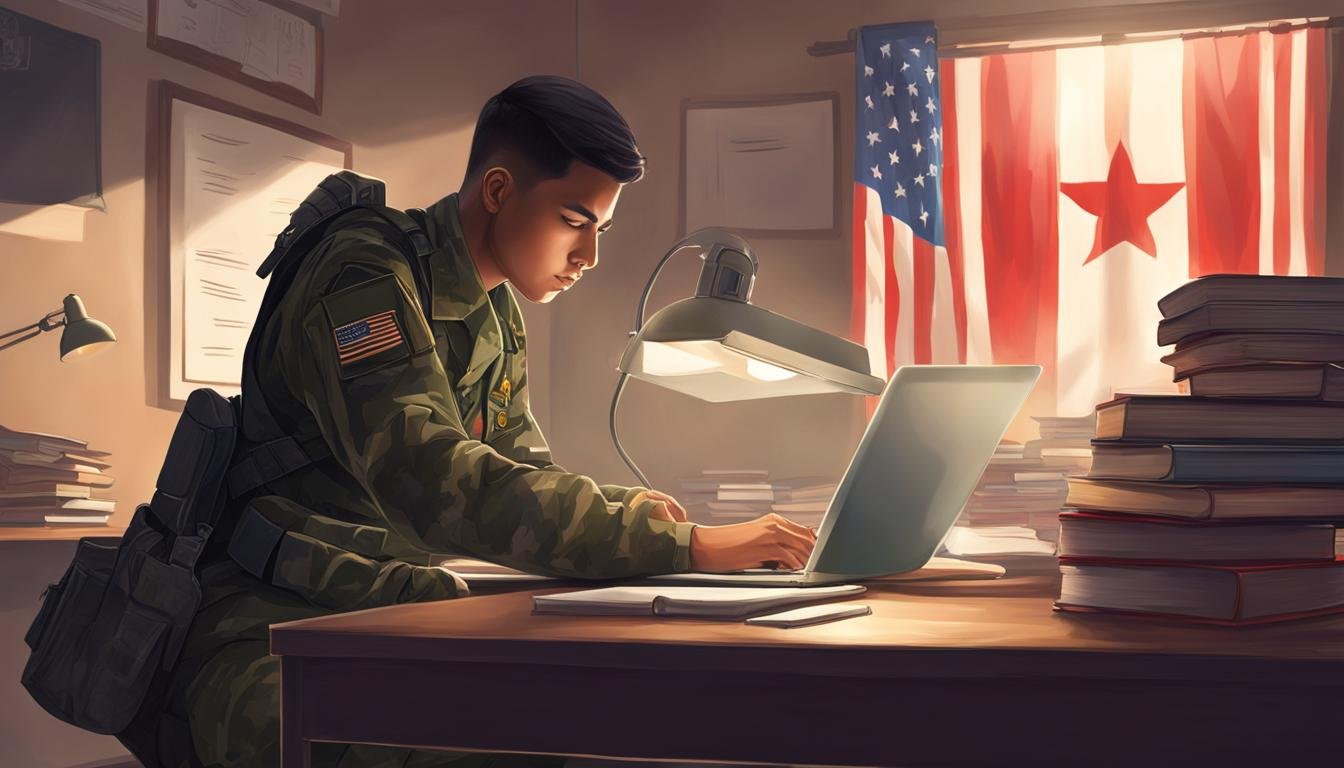Applying to college as a veteran can present unique challenges compared to traditional high school seniors. However, with nearly 900,000 veterans utilizing their Post-9/11 GI Bill® benefits for higher education, it is evident that many veterans successfully navigate the college admissions process. This section aims to provide guidance on how to organize your application materials, apply for benefits early, arrange for transfer credit, brush up on skills, and seek out resources to make the application process as seamless as possible for veterans.
Key Takeaways:
- Organize your application materials effectively, including a compelling essay that showcases your unique experiences as a veteran.
- Apply for benefits and financial support early to ensure a smooth process.
- Understand the transfer credit policies of different colleges to potentially skip certain requirements.
- Consider enrolling in classes at a community college to strengthen academic skills before applying to a four-year school.
- Take advantage of resources such as veterans’ resource centers and fellow veterans for advice and support throughout the application process.
Organize Your Application Materials

When applying to college as a veteran, it is important to organize your application materials effectively. These materials typically include a letter of recommendation, transcripts from military training and previous college courses, standardized test scores (if required), and an application essay. Investing time in writing a compelling essay that highlights your unique experiences and personality can make your application stand out.
As a military veteran, you possess valuable skills and experiences that can set you apart from other applicants. Use your essay to showcase how these experiences have shaped you and influenced your desire to pursue higher education. Highlight your leadership abilities, adaptability, and commitment to service. Make sure to tailor your essay to the specific college or university you are applying to, demonstrating your genuine interest in their institution.
“My military service taught me the importance of teamwork and resilience. These qualities have fueled my desire to pursue a college degree. Through my essay, I aim to convey how my experiences as a veteran have prepared me to contribute to the campus community and succeed academically.”
Additionally, when organizing your application materials, be sure to follow each college’s specific guidelines regarding submission formats and deadlines. Double-check that you have included all the necessary documents and that they are free from any errors or inconsistencies. Keeping your application materials well-organized will help demonstrate your attention to detail and professionalism.
Packaging Your Application Materials
To further enhance the organization of your application materials, consider creating a comprehensive packaging system. Use labeled folders or envelopes to separate and categorize each document, making it easier for admissions officers to navigate and review your materials. Clearly indicate your name and contact information on each document to ensure that they are correctly associated with your application.
| Application Material | Packaging Tip |
|---|---|
| Transcripts | Place them in a sealed envelope from your previous school or request them to be sent directly to the college admissions office. |
| Letter of Recommendation | Include a brief note of gratitude and a copy of your resume to provide context for the recommender. |
| Standardized Test Scores | Print a copy of your scores or request official scores be sent directly from the testing agency. |
| Application Essay | Print your essay on high-quality paper and proofread it carefully for any errors or typos. |
By organizing your application materials thoughtfully and following the specific guidelines of each college or university, you are setting yourself up for success in the college admissions process. Your well-packaged application will leave a positive impression on admissions officers and increase your chances of being accepted into your desired institution.
Applying for Benefits and Financial Support
When transitioning from military service to college, it is crucial for veterans to understand the process of applying for benefits and financial support. Many veterans rely on financial assistance, such as GI Bill® benefits and scholarships, to fund their education. By applying for these benefits early on, veterans can ensure a smooth and timely processing of their applications.
Researching and understanding the different options available is key to maximizing financial support. The Yellow Ribbon Program, scholarships, grants, and federal funding are some of the avenues veterans can explore. Each option has its own set of criteria and requirements, so carefully reviewing the eligibility criteria and application deadlines is important to secure the maximum available financial support.
Additionally, veterans should take advantage of the resources available to them during the college admissions process. There are numerous college admissions resources specifically tailored for veterans, providing guidance on navigating the application process and understanding the benefits they are eligible for. These resources can offer valuable insights and assistance in filling out application forms, gathering the necessary documentation, and ensuring that all requirements are met.
Table: Types of Financial Support and Benefits for Veterans
| Type | Description |
|---|---|
| GI Bill® Benefits | Financial assistance provided to veterans to cover tuition, fees, and housing expenses. |
| Scholarships | Merit-based or need-based financial aid awarded to veterans to support their education. |
| Grants | Financial assistance provided to veterans based on their financial need and eligibility criteria. |
| Yellow Ribbon Program | A cost-sharing program between the Department of Veterans Affairs and participating colleges to cover tuition and fees not already covered by the GI Bill®. |
| Federal Funding | Financial assistance provided by the federal government through programs such as Pell Grants. |
By being proactive and well-informed about the benefits and financial support available, veterans can alleviate the financial burden of pursuing a college education and focus on their academic and personal growth.
Selecting the Right College as a Veteran Applicant
As a veteran applicant, choosing the right college is an important decision that can greatly impact your college experience and future career. While the college admissions process can be challenging for anyone, veterans may face unique obstacles and considerations. However, with careful research and planning, you can overcome these challenges and find a college that aligns with your goals and supports your transition from military service to academia.
Factors to Consider
When selecting a college as a veteran applicant, it’s crucial to consider factors such as academic programs, campus culture, location, and support services for veterans. Look for colleges that offer programs and majors that align with your career goals and areas of interest. Additionally, consider whether the college has a supportive campus culture that values and understands the experiences of veterans. Proximity to military installations or veteran organizations can also provide additional resources and support.
“Choose a college that understands the unique experiences and challenges veterans face and offers comprehensive support services to help you succeed.”
Furthermore, research the support services available for veterans at each college you are considering. Look for dedicated veterans’ resource centers that offer academic advising, counseling, career services, and networking opportunities. These support services can make a significant difference in your college experience and help you navigate any challenges that may arise during your transition to civilian and academic life.
Connect with Other Veterans
Another important aspect of selecting the right college as a veteran applicant is the opportunity to connect with other veterans. Many colleges have student organizations or clubs specifically for veterans, providing a sense of camaraderie and support. Reach out to these organizations to learn more about their activities and how they support veterans on campus. Connecting with fellow veterans can provide valuable insights, advice, and a sense of community as you embark on your college journey.
Brushing Up on Skills

As a military veteran applying to college, it’s important to ensure that your academic skills are up to par before embarking on your academic journey. Many veterans apply to college as transfer students, which means that having recent college-level education and strong academic skills is beneficial. If you haven’t taken many college classes, it’s recommended to enroll in some courses at a community college before applying to a four-year institution. This will help you brush up on your skills and demonstrate your readiness for higher education.
There are nonprofit programs designed specifically for veterans, such as Veterans Upward Bound and the Warrior-Scholar Project, that offer tutoring and instruction to strengthen basic academic skills. These programs can provide the support you need to succeed in college and help bridge any gaps in your knowledge or experience. By participating in these programs, you can feel more confident in your abilities and better equipped to handle the academic challenges that lie ahead.
Additionally, it’s essential to remember that your military experience has provided you with valuable transferable skills, such as discipline, leadership, and problem-solving. These skills can be applied to your college studies and help you excel in a variety of academic disciplines. Don’t underestimate the value of your military background and the unique perspective it brings to the classroom.
Table: Nonprofit Programs for Veterans’ Academic Support
| Program Name | Description | Contact Information |
|---|---|---|
| Veterans Upward Bound | Provides academic support, including tutoring and instruction, to veterans preparing for college. | Phone: 123-456-7890 Email: info@veteransupwardbound.org |
| Warrior-Scholar Project | Offers immersive academic boot camps for veterans to help them transition successfully to college. | Phone: 987-654-3210 Email: admissions@warrior-scholar.org |
By taking advantage of these resources and actively seeking out opportunities to strengthen your academic skills, you’ll be better prepared for college admissions and success in your future studies. Don’t hesitate to reach out to veterans’ resource centers or student organizations on campus for additional support and guidance throughout the application process and beyond.
Seeking Out Resources

When navigating the college admissions process as a veteran, it is important to seek out resources that can provide guidance and support. These resources can help veterans understand the specific criteria and requirements for admissions, as well as provide valuable advice on how to stand out as an applicant.
One valuable resource for veterans is the veterans’ resource centers located at many colleges and universities. These centers often have staff members who are knowledgeable about the application process and can provide personalized advice based on each school’s requirements. They can also connect veterans with other resources and support services available on campus.
Another great way to find resources is by connecting with other veterans. Joining student organizations or online communities specifically for veterans can provide a network of support and a wealth of insights and tips. Sharing experiences and learning from others who have gone through the college admissions process can be incredibly valuable.
Additionally, organizations like the Dolce Center for the Advancement of Veterans and Servicemembers (CAVS) at Northeastern University offer comprehensive guidance and support for veterans throughout the college application and transition process. These organizations can provide information about available resources, scholarships, and support services specifically tailored to veterans.
Table: Resources for Veterans in College Admissions
| Resource | Description |
|---|---|
| Veterans’ Resource Centers | Located at many colleges and universities, these centers provide personalized advice and connect veterans with resources on campus. |
| Student Organizations/Online Communities | Joining these communities allows veterans to connect with others who have gone through the college admissions process and provides valuable insights and tips. |
| The Dolce Center for the Advancement of Veterans and Servicemembers (CAVS) | This organization offers comprehensive guidance and support for veterans, including information about resources, scholarships, and support services. |
By seeking out these resources, veterans can gain valuable support and advice throughout the college admissions process. From understanding the criteria and requirements for admissions to connecting with other veterans, these resources can make the journey smoother and increase the chances of success in securing admission to the desired college or university.
Conclusion
Applying to college as a veteran may come with unique challenges, but it is a path that many veterans have successfully taken. By organizing your application materials, applying for benefits early, arranging for transfer credit, brushing up on skills, and seeking out resources, you can navigate the college admissions process with ease. Your military experience is a valuable asset that can help you stand out among other applicants.
Remember to research and select colleges that align with your goals and preferences as a veteran applicant. Understanding the transfer credit policies of different institutions can also save you time and potentially help you graduate earlier. Take advantage of resources available to veterans, such as staff members at veterans’ resource centers and fellow veterans through student organizations or online communities.
With the right guidance and support, you can find the best college for your career goals and achieve success in your education. Navigating the college admissions process may seem overwhelming, but with your determination and the resources available to you, you can confidently pursue your college education as a veteran.
FAQ
How should I organize my application materials as a veteran applying to college?
It is important to gather your letter of recommendation, transcripts from military training and previous college courses, standardized test scores (if required), and an application essay. Writing a compelling essay that highlights your unique experiences and personality can make your application stand out.
What financial support options are available for veterans applying to college?
Many veterans rely on financial support, such as GI benefits and scholarships, to fund their education. It is crucial to apply for these benefits early, as the process can take several months. Researching and understanding the different options available, such as the Yellow Ribbon Program, scholarships, grants, and federal funding, can help veterans secure the maximum amount of financial support for their degree.
How can I transfer my previous college credits or military class credits to my new school?
Veterans often have previous college credits or military class credits that can be transferred to their new school. Understanding the transfer credit policies of different colleges and universities can help veterans skip certain general education requirements and potentially graduate earlier.
What should I do if I haven’t taken many college classes before applying to a four-year school as a veteran?
If veterans have not taken many college classes, it is recommended to enroll in some classes at a community college before applying to a four-year school. Nonprofit programs, such as Veterans Upward Bound and the Warrior-Scholar Project, can provide tutoring and instruction to strengthen basic academic skills before attending classes again.
What resources are available to veterans during the college application process?
Veterans can benefit from various resources during the college application process. Staff members at veterans’ resource centers can provide specific advice about each school’s application process. Connecting with fellow veterans through student organizations or online communities can provide valuable insights and tips. The Dolce Center for the Advancement of Veterans and Servicemembers (CAVS) at Northeastern University offers guidance and support for veterans throughout the college application and transition process.
What are some common challenges when applying to college as a veteran?
Applying to college as a veteran may come with unique challenges. However, by organizing application materials, applying for benefits early, arranging for transfer credit, brushing up on skills, and seeking out resources, veterans can navigate the college admissions process with ease. Veterans’ military experience can be a valuable asset in their college applications, helping them stand out among other applicants.



